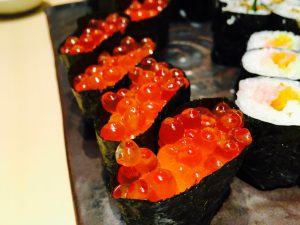Negative Feedback Common in Japan
Feedback in a Japanese Company By Patricia Pringle American Engineer Sent to Japan for Training Joe was a factory engineer at a Japanese company in the United States. After working for two years at their factory in the Midwest, he was offered a chance to go to Japan for six months to be trained at […]
ikura, one of the most popular sushi items
Ikura, a Staple Sushi Item, Has Its Origins in Russia Referred to as the “Jewel of the Sea,” ikura (salmon roe) appeals to us with its ruby luster and “popping” sensation when eaten. Because ikura is a popular sushi item, it is natural that a lot of people think that ikura originated in Japan. Ikura […]
The Air of Someone "KY" in Japan
By an Australian living in Tokyo The Air of Someone "KY" What does KY ケーワイ means? The Japanese have a way of using the English alphabet as abbreviations for Japanese terms. One recent term that I particularly like is “KY” which stands for “Kuki wo Yomenai” (the inability to read the air.) The “air” in […]
What is your job-related worry?
What is your job-related worry? 1. Human relations2. Quality of job3. Volume of work4. Company future5. Suitable job6. Pay raise and promotion7. Life after retirement8. Job security9. Personnel shuffl e10. Accidents and mishapsSource: The Ministry of Health, Labour and Welfare (conducted in 2019)
Suntory Natural Mineral Water History
Karamucho Suntory Natural Mineral Water If you want to make sake or other beverages that lots of people will enjoy, good quality water is indispensable. Knowing full well of the importance of good quality water, Suntory is fastidious when it comes to water. With its corporate message of Bringing Water to Life, Suntory has searched […]
When do you realize you are Japanese?
When do you realize you are Japanese? 1. Drinking miso soup and feeling happy2. Soaking in a hot spring3. Drinking Japanese tea and feeling happy4. Smelling tatami mats and feeling relaxed5. Eating tsukemono (pickles) and becominghappy6. Sleeping in a futon (Japanese bed) andfeeling relieved7. Getting excited at a game played by theJapanese National Team8. Thinking […]
The ideal job in Japan for Japanese people
The ideal job 1. Stable income 2. Fun and exciting 3. Makes good use of my skills 4. No risk of ruining my health 5. Positive infl uence for the world 6. No worry of losing the job 7. High income 8. Not sure 9. Undecided 10. Other factors Source: Cabinet Office, Government of Japan […]
What is "nikujaga"? Japan's typical mama's dish
Nikujaga Born from Heihachiro Togo’s Half-Remembered Recipe History of Nikujaga Together with miso soup, Nikujaga (meat and potatoes) is always counted among the tastes of Mom's home cooking. Representative of home cooking, Nikujaga is a national dish that is included nearly always in the menus of folksy restaurants, bars, and company cafeterias. With its slightly […]
Different types of workers in Japan
Differences Between "Se-ishain" and "Haken-shain" By an Australian living in Tokyo My husband recently met with a former colleague and a friend from his university. The colleague was a man who was recently released by the company because he was a “haken-shain” (short-term contract worker). His friend works for the government’s public employment office. My […]
“HoRenSo” for non-Japanese employees (3) Honest Reporting
“HoRenSo” for non-Japanese employees (3) Honest Reporting Q: I learned about reporting, contacting and consulting during the initial training. I was taught "the conclusion should come first," "use of 5W1H (why, where, when, who, what and how)," "always consult first and not to act independently." Among the teachings, the lecturer made an emphasis on "making an […]










